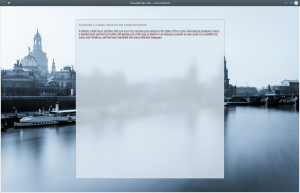

These three words, passing from use, remind us of the mutability and great age of our language, that gigantic construction built from nothing but a need to understand the other fellow and in turn tell him what we think.

Yet sometimes it is instructive to stop and consider an aspect – any aspect – of life to which we have never before given much thought. Without it we would never get anything done. One of our vital abilities is to take things for granted. “crow”, “crash”, “whip”) their etymology is easy to explain, but the expression of abstract ideas is so subtle that there must originally have been some common ground, however tenuous. Might the initial aspirant have arisen, in the very deepest past, from association with this? After all, words have to begin somewhere. When we are puzzled or confounded by something we often exhale through partially pursed lips. This somehow suggests, to me at any rate, the state of ignorance.

“When”, “what”, “where”, “who”, “why”, “which” and “how” all begin with aspirants. “Where”, however, comes to us through the interrogative Anglo Saxon form “hwár?”, which is a relative of “hwā?”, “who?” “Here” and “there” are closely related: the latter probably grew out of the former, a pleasing idea since we always start from “here”, unless of course we are Irish and giving directional advice (“I wouldn’t be starting from here”). “Here”, “there” and “where” are ancient words, as one might expect of such important tokens of meaning. Likewise, “thither” intensifies “there” and “whither” intensifies “where”. The command “bring him hither!” implies “from that place to this” more imperiously than “bring him here!” I believe that “hither” is the intensive form of “here”. Consider these quotations from the dictionary: “Come hither unto me” (1550, and by the way “come hither” is still, just about, used adjectivally to describe a coy, arch, or seductive look bestowed by a woman) “hyther tendeth al prudence and pollycy” (1538). The modern replacement for “hither” is simply “here”, doing away with the sense of movement. It is a shame, because their loss also deprives us of shades of meaning. These three words, for a long time merely literary, have gone out of fashion altogether except in compound use (“hitherto”, “hither and thither”) or when the writer or speaker wishes to introduce a whimsical note (“whither Obama now?”).


 0 kommentar(er)
0 kommentar(er)
